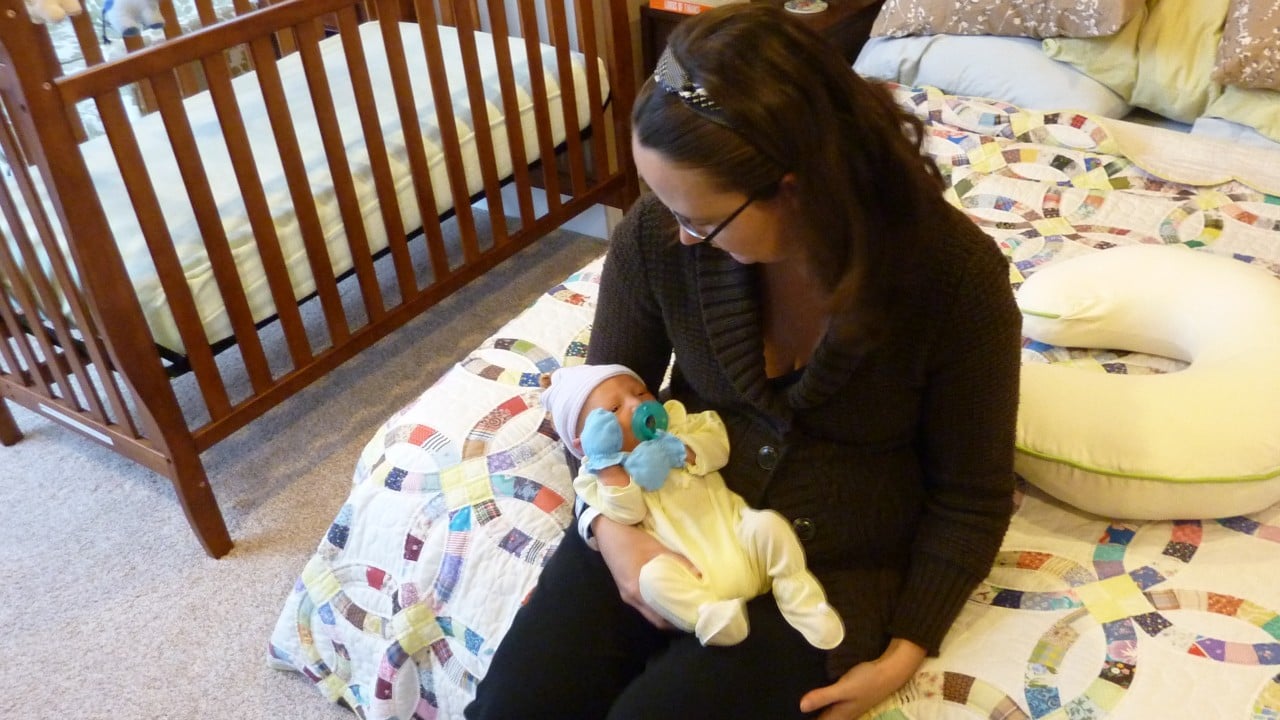When you have a baby, people tell you to ignore the advice and trust your gut. That didn’t work for me at all.
When my first son was about a month old, I was at a social gathering and a friend offered to hold him while I ate. Since trying to eat while holding a baby is like trying to focus on playing a board game while someone throws spaghetti at you, I was happy to hand him off for a bit. After a little while, my friend walked over with my son because he had begun to cry and she asked, “Is this his ‘hungry’ cry?”
I looked back at her and thought: Your guess is as good as mine.
Some parents and advice books told me that when I became a parent, I would learn what my baby’s different cries meant and therefore it would be easy to tend to my child’s needs. But once I had an actual baby, I couldn’t really tell the difference between a hungry cry, a tired cry, and an “I am sad because I was enjoying watching the ceiling fan and now, I can no longer see it” cry.
I told my friend my son might be hungry, and I took him to a quiet room to feed him. As an introvert, I find alone time recharging, so I figured it was a chance to have a little break from socializing even if I didn’t really know what the crying was about. I changed him, fed him, and then rocked him to sleep, and at some point, he stopped crying. So, it seemed that he was likely crying about one of those things, but I couldn’t say which one.
I’ve heard plenty of other parenting advice about relying on your natural instincts:
“Breastfeeding is natural! You’ll know how to do it.”
“You’ll know how to calm your crying child.”
“Just stop reading all the advice books and let your instincts guide you on whether you should keep trying to get little Maya to eat her sweet potatoes when she keeps throwing them at the wall!”
But I soon realized that I did actually need more than my natural intuition for parenting challenges—I clocked a lot of hours with lactation consultants trying to figure out how to breastfeed and often channelled Dr. Harvey Karp’s five Ss when trying to calm my crying baby down. Maybe some of these things did just come naturally to some people, but I was not one of them.
I’ve also always weighed decisions carefully before making them and being in charge of a small human suddenly meant I had a host of new decisions to make. The first big one was about whether or not I even wanted to have a kid. I was not a person who always knew in her bones that she wanted a baby (generally speaking, my bones are more structural support than oracle). I thought I probably did want to become a mom, but I wasn’t completely sure, and I spent a lot of time weighing the pros and cons and talking to my husband about it before making the decision.
Of course, a decision like whether or not to become a parent is one that is probably worth giving some thought to. Even seemingly minor decisions can sometimes feel huge in the early parenting days—if you allow your toddler to watch that extra hour of PBS kids each day will that lead to long-term problems? Could your choice to not buy the organic baby puffs ruin your child’s chances of winning a future spelling bee?
During the past couple of years of the pandemic, it’s been particularly hard to make parenting decisions. I feel pretty confident that if I had a child in the time of the ice age that I would have the natural instinct to pick them up and run if a sabre-toothed tiger was coming. But in the time of COVID, when advice varies and changes constantly, I find it extremely difficult to just quiet my mind and ask my natural parenting instincts if letting my child go to a bounce house birthday party is worth the mental health benefits if it also means a potential COVID exposure.
It’s not that I don’t have any instincts. When parenting solutions are suggested to me (which they were at a rate of approximately 100 times a day when my kids were younger) I could often easily identify things I did not want to do. As someone who gains energy from alone time, having a child attached to me all day and all night was not going to work for me. And being a harsh disciplinarian did not jibe with my personality. But ruling out some of what you don’t want to do doesn’t necessarily make it easy to choose what you do want to do when there are a seemingly endless amount of options in modern parenting.
In the time that I’ve been a parent, I have developed some strategies for making parenting decisions. I’ve found certain friends or experts that align with my values that I try to listen to more than the others. I talk over options with my husband and have sometimes been known to make a full-on weighted decision matrix breakdown of the positives and benefits of a bigger decision.
But I’ve also accepted that for me, a lot of parenting is never going to be as simple as just trusting my instincts.
Julie Vick is the author of Babies Don’t Make Small Talk (So Why Should I?): The Introvert’s Guide to Surviving Parenthood.
